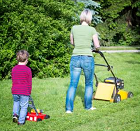The recent college-admissions scandal in the US was certainly shocking (or not), but it did have the benefit of introducing me to a couple of terms. Most people probably know about helicopter parents—parents who are constantly hovering over their children. Two terms that the scandal taught me were lawnmower parents and snowplow parents.
 Both expressions refer to parents who clear the path for their children, or as one description has it, "parents who rush ahead to intervene, saving the child from any potential inconvenience, problem or discomfort." The same article suggests alternative terms bulldozer parents and—heh—curling parents, from the sport played on ice.
Both expressions refer to parents who clear the path for their children, or as one description has it, "parents who rush ahead to intervene, saving the child from any potential inconvenience, problem or discomfort." The same article suggests alternative terms bulldozer parents and—heh—curling parents, from the sport played on ice.
These terms are relatively new—snowplow parent goes back to about 2008, lawnmower parent maybe to 2016. We can safely assume, I think, that the phenomenon being described is not new, nor of course is the criticism of how other people do their parenting.
For fun origins today it's spa. At work we have spa water, which is water infused with fruit or vegetables or herbs (or all three).[1] Or as an article on Huffpo says:
'What makes water "spa water?"' you might be asking yourselves. Great question, everyone. What makes water "spa water" is this: you float citrus slices in it -- or fruit or cucumbers -- and you either drink it while in a spa, or while pretending you are in a spa. BOOM, spa water. Are you enthralled and intrigued?
This seems like a relatively ordinary thing, but there's a surprisingly large, um, literature on spa water of this sort, including
hardback books with recipes. Exploring the origins of the term spa water took me on a little journey, which I'll share with you.
 Spa water at our work is inspired by water that's provided at spas. What is a spa? Well, that's in the eye of the beholder. It's a place you can get beauty treatments; I guess I envision luxury retreats where you wear a fluffy robe and soak in the waters. But in the narrow definition—a spa is about beauty treatment—a modest nail salon can call itself a spa, or perhaps if they offer a few extra amenities, not forgetting the spa water. (As Jimmy McGill's landlady reminds us in Better Call Saul, cucumber water is for customers, not for shady lawyers renting out her back room.)[2]
Spa water at our work is inspired by water that's provided at spas. What is a spa? Well, that's in the eye of the beholder. It's a place you can get beauty treatments; I guess I envision luxury retreats where you wear a fluffy robe and soak in the waters. But in the narrow definition—a spa is about beauty treatment—a modest nail salon can call itself a spa, or perhaps if they offer a few extra amenities, not forgetting the spa water. (As Jimmy McGill's landlady reminds us in Better Call Saul, cucumber water is for customers, not for shady lawyers renting out her back room.)[2]
The water is the salient part of a spa here. Before spa water was infused water, it was mineral water bottled and sold for its health-giving properties. There are many places whose water is reputed to have these properties, but there is one original spa water: the water from springs at the town of Spa, Belgium. They've been selling their labeled Spa water since the 17th century. (Apparently in Dutch, the brand Spa has been genericized to refer to any mineral water.)
 One thing that's not clear is how the town of Spa got its name. It's possible that it's from an old Walloon word for "spring" or "fountain," which would certainly make sense.
One thing that's not clear is how the town of Spa got its name. It's possible that it's from an old Walloon word for "spring" or "fountain," which would certainly make sense.
There's some evidence that the Romans knew about the water from Spa. But the Romans didn't just drink exotic waters, they were enthusiastic bathers. And that's the other definition of spa: a place you take the waters. (I was delighted to learn that this is known as balneotherapy, and it apparently can have some benefit.) This sense of spa is generic; for example, there's Leamington Spa in England, which was renamed from Leamington Priors in 1838 to match the name of the Belgian town. And from there we get back to our more modern sense of a spa, a place where you take treatments for, you know, health and beauty.
The bathing sense of spa has another offshoot—it's used as a synonym for a hot tub. In my wanderings, I ran across spa water as water that's in hot tubs. At least there's not much danger that you'd confuse your fruit-infused drink with the stuff bubbling in your hot tub. At least, I hope not.
Like this? Read all the Friday words.